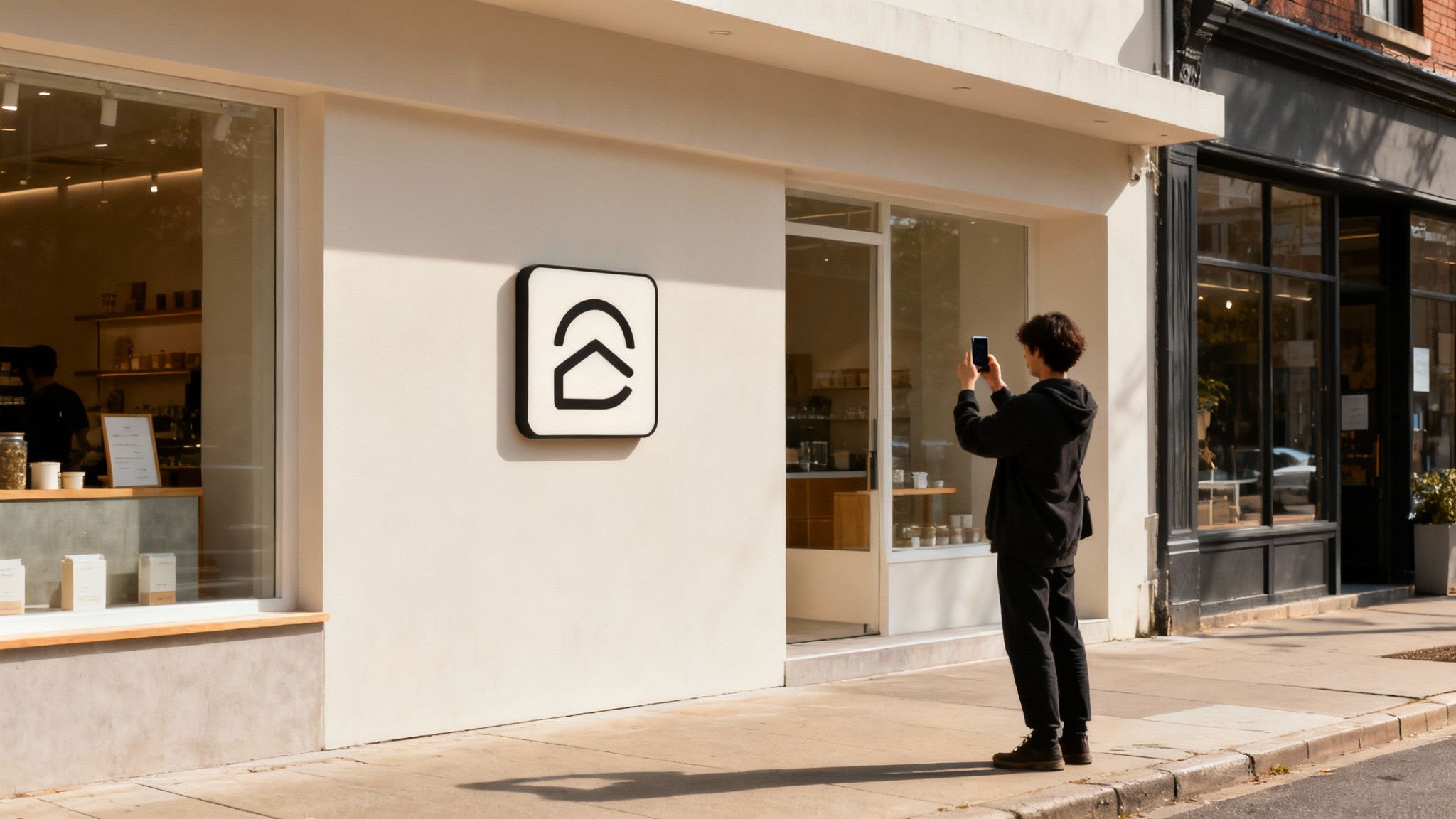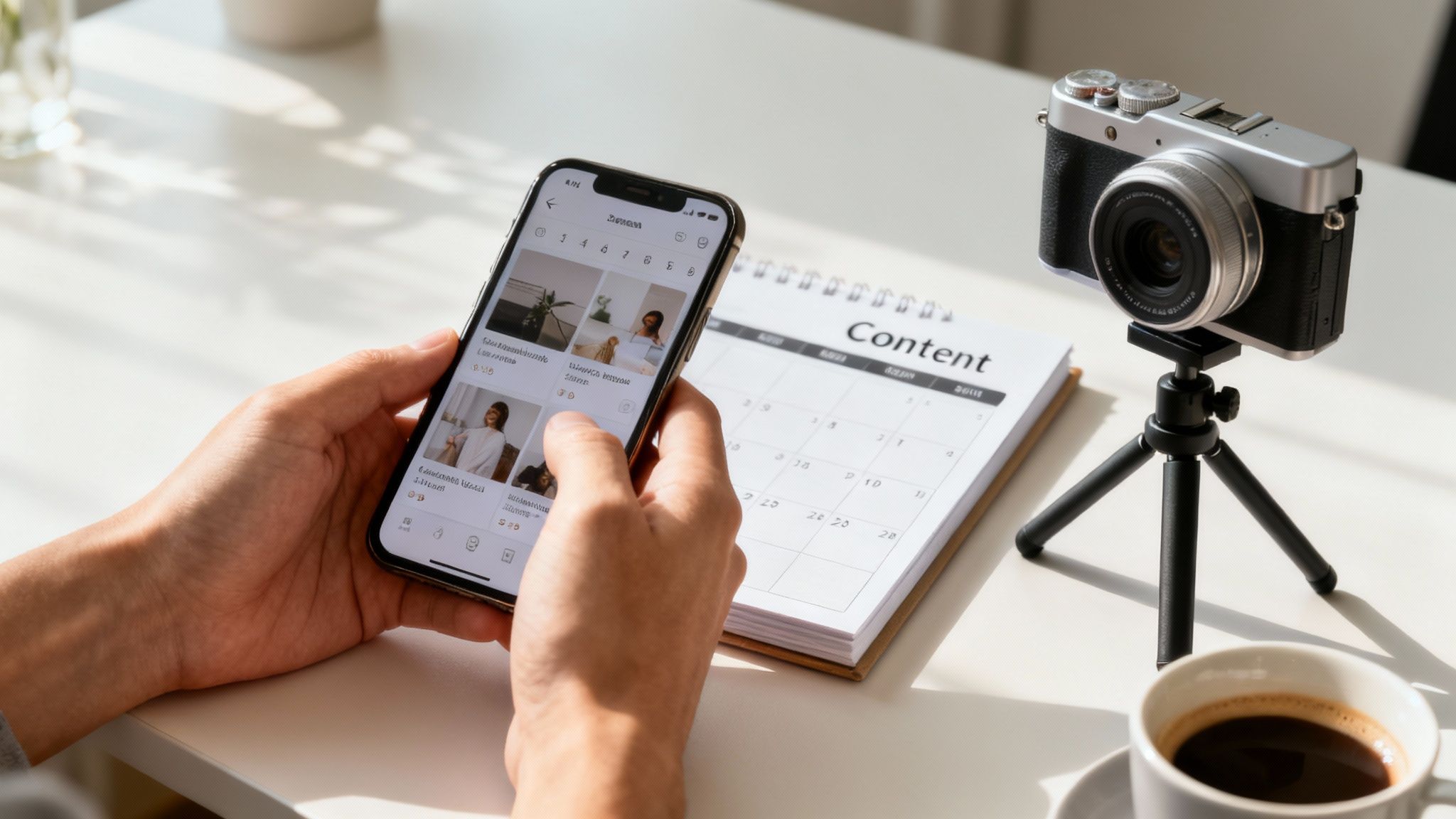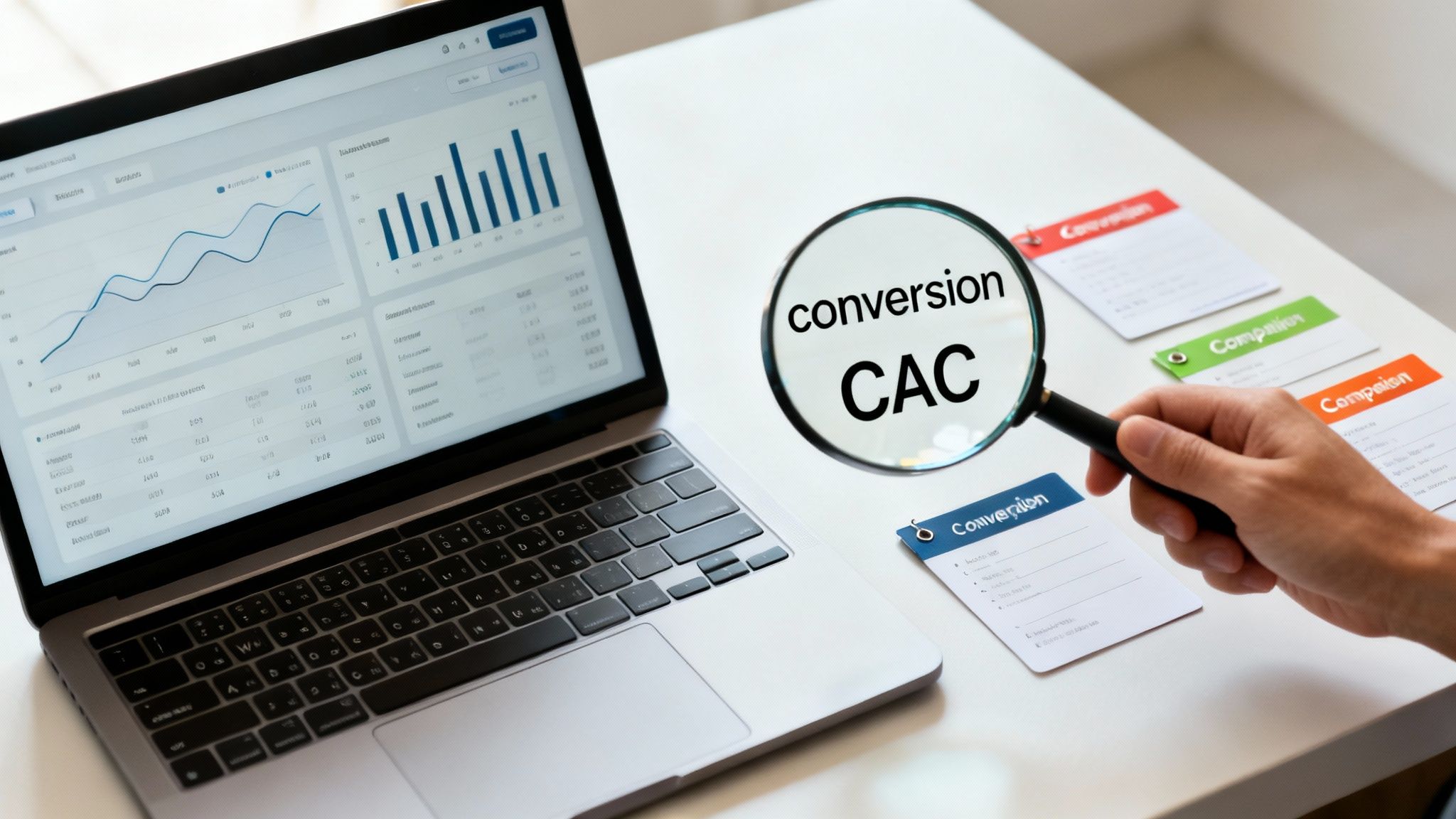Running a small business is a wild ride. You're the boss, the janitor, and the person who waters the office plant. When you add "marketing expert" to that list, things can get crazy fast. It feels like you're supposed to be a whiz at websites, social media, and Google ads, all while keeping your actual business going. It's a common feeling, especially when you see big companies with huge teams. It can make you feel like you're in a tricycle race against sports cars.
But here’s a secret: you don’t need a giant pile of cash or a fancy degree to be good at marketing. The truth is, many of the biggest small business marketing challenges can be solved with simple, easy steps. You don't need to be a computer genius. You just need a clear plan and the right tools, especially a great website.
This guide is here to help. We're going to break down the top 10 marketing problems that small businesses like yours face every day. For each problem, we’ll give you easy-to-understand tips that you can start using right away. We'll show you how to get your website noticed and make sure your marketing brings in real customers. Our goal is to make marketing simple and show you that you can totally do this. Let’s dive in and turn those problems into your biggest wins.
1. Not Enough Money or Time
Of all the small business marketing challenges, this one is the big boss. You have an amazing product or service, but your marketing money is more like a piggy bank than a treasure chest. It's tough to feel like you can compete with big companies that have tons of cash for ads. Plus, as a small business owner, you're already doing a million jobs, which leaves you with almost no time.

But here's the good news: you don't need a huge budget to make a big splash. A small budget just makes you smarter and more creative. Think about it: a good website doesn't have to cost a fortune, but it can work for you 24/7. It’s all about finding clever ways to reach people without spending a lot of money. You can do this!
How to Market with a Small Budget
Having a plan is the first step to winning with a small budget. You can check out a practical guide to small business budgeting to get your money sorted out. Once you know what you can spend, you can make every dollar count with these ideas:
- Start with Your Website: Your website is your online home. Make it look good and make it easy for people to find what they need. A simple, clear website is the best marketing tool you can have.
- Use Free Tools: You don't need fancy software. Use free tools like Canva to make cool pictures, or Google Analytics to see who visits your website. They're easy to use!
- Let Your Fans Help: Ask happy customers to leave reviews or share pictures. People trust other people, and this kind of marketing is totally free.
- Team Up: Partner with another local business. You can have a sale together or share each other's posts on social media. It's like getting two for the price of one!
By being smart, you can turn a small budget into a secret weapon. To learn more about getting customers without spending a lot, check out our guide on how to get more customers.
2. No One Knows Who You Are
Getting your business name out there can feel like trying to get noticed at a rock concert. You know your business is awesome, but there are so many other businesses yelling for attention. As a small business, making your brand memorable is a major marketing challenge, especially when you can't afford a TV commercial.

But building a brand isn't just for big companies. Think about your favorite local coffee shop. You probably remember it because the coffee is great and the people are friendly. They became memorable by being awesome, not by spending a ton of money. Your brand is your story, and telling it well is how you stand out. A great website is the perfect place to tell that story.
How to Build Your Brand
First, figure out what your business is all about. Your brand is more than just your logo; it's the feeling people get when they think of your business. Once you know who you are, you can share it with the world with these simple steps:
- Tell Your Story on Your Website: Use your "About Us" page to share why you started your business. People love to hear real stories. It makes them feel connected to you.
- Look the Same Everywhere: Use the same logo, colors, and friendly tone on your website, your social media, and your signs. This helps people remember you.
- Give People a Great Experience: The best marketing is a happy customer. Make sure your website is easy to use and your service is friendly. Happy customers will tell their friends about you!
- Be Part of Your Town: Get involved in local events or team up with other local businesses. This shows people you care about your community.
3. Digital Marketing Feels Too Complicated
The online world moves super fast. For a small business owner, keeping up can feel impossible. This is one of the biggest small business marketing challenges. There are so many social media sites and marketing tools, it’s easy to feel lost and not know where to start. It all sounds so techy and hard.

But you don't need to be a computer whiz to do well online. The trick is to start small and focus on the important stuff. The most important thing is having a good website. Think of your website as your home base. All your other online marketing, like social media, should lead people back to your website. You can absolutely do this, and we can help make it simple.
How to Master Digital Marketing
Getting good at online marketing is easier when you have a plan. Instead of trying to be everywhere, just focus on a few key things that will help you the most. For more ideas, you can look at these essential digital marketing tips for small businesses.
Here’s how you can get started:
- Build a Great Website: Your website is your most important marketing tool. Make sure it's easy to use, looks good on a phone, and clearly shows what you do. This is your foundation.
- Pick One Social Media Site: You don't have to be on every platform. Pick the one where your customers spend their time. If you sell pretty things, Instagram might be for you. If you help people with their homes, Facebook could be great. Get good at one before you add another.
- Learn for Free: You can learn a lot about marketing for free online. Websites like Google offer free lessons that teach you the basics in simple terms.
- Let Computers Do the Work: You can use tools that automatically post on social media for you. This saves you a ton of time. Just set it up once and let it go!
- Don't Be Afraid to Ask for Help: If things like your website design or running ads feel too hard, it's okay to get help. We make this stuff easy so you can focus on your business.
By starting with a great website, you can build a strong online presence without the headache. To learn more, check out the basics of digital marketing for beginners.
4. Not Knowing What's Working
Making marketing choices without knowing what's working is like trying to bake a cake without a recipe. You're just guessing! Many small businesses face this marketing challenge. They think that looking at data is too complicated or expensive. Big companies have teams of people to look at numbers, but you're just trying to figure out if anyone even saw your last Facebook post.

The great news is that you don't have to be a math genius to understand your customers. There are easy, free tools that can help you. The most important numbers come from your website. You can see how many people are visiting, what pages they like the most, and where they are coming from. This information is like a treasure map that shows you what to do next.
How to Use Data Without Being a Data Scientist
Getting started with data is easier than you think. You don't need a crazy complicated system. You just need to look at a few simple numbers. For a simple guide on this, check out how to use Google Analytics to improve website design. Here are a few easy ways to begin:
- Use Google Analytics: It's a free tool you can put on your website. It tells you how many people visit your site and what pages they look at. It's like having a friendly robot tell you what's popular!
- Look at Your Website's Forms: If you have a "Contact Us" form on your website, you can see how many people fill it out. This tells you if your site is convincing people to reach out.
- Just Ask!: Put a simple question on your website like, "How did you hear about us?" When people tell you, you'll know which of your marketing efforts are working. It's that easy!
- Check Your Social Media: Every social media site has a free "Insights" or "Analytics" page. It shows you which of your posts people liked the most.
5. Social Media is a Full-Time Job
It feels like you need to be on TikTok, Instagram, Facebook, and a dozen other places all at once. This is one of the most tiring small business marketing challenges because it takes so much time and creativity. You have to think of new things to post every day, answer comments, and keep up with what's popular. It's a whole job by itself!
But here's a secret: you don't need to be on every social media site. The goal isn't to be everywhere; it's to be where your customers are. And remember, the goal of social media is usually to get people to visit your website. Your website is where you can really tell your story and sell your stuff. Think of social media as friendly signs pointing people to your amazing website.
How to Master Social Media without Burning Out
The trick to social media is to have a simple plan. You don't have to think of something new every single day. A little planning can save you a lot of time.
- Pick Your Playground: Don't try to be on every site. Just pick one or two where your customers hang out.
- Plan Your Posts: Take a few hours once a month to plan out all your posts. You can write them all at once so you're not scrambling for ideas later.
- Use Scheduling Tools: You can use free tools that will post for you automatically. You just set it up, and it does the work for you!
- Be Helpful, Not Salesy: Most of your posts should be fun, helpful, or interesting. Only a few should be about selling something. This makes people want to follow you.
- Talk to People: Spend just 15 minutes a day replying to comments. It shows people you're listening and you care.
For local businesses, running simple ads can help a lot. To learn how, check out this guide on using Facebook ads for local businesses.
6. Showing Up on Google is Hard
Trying to get your website on the first page of Google can feel like a mystery you can't solve. This is one of the toughest small business marketing challenges because you're competing with big companies that have teams of people working on it. Plus, Google's rules seem to change all the time.
But here’s a secret: Google loves small businesses, especially local ones. You have an advantage because you can be the best answer for what people in your town are searching for. You don't need to be number one for everything, just for the things that matter to your customers. The best way to do this is with a great website that answers people's questions.
How to Improve Your Search Visibility
Getting found on Google isn't about secret tricks. It's about being helpful and making your website easy for Google and people to understand. To get started, you can use our small business SEO checklist for a simple guide. Here are some powerful first steps:
- Be the Local Star: If you have a physical shop, your Google Business Profile is your best friend. Fill it out completely with your address, hours, and photos. This is the fastest way to show up when people search "near me."
- Think Like a Customer: What words would your customers type into Google to find you? Use those words on your website, especially on your homepage.
- Answer Questions on Your Website: Create a page on your website that answers common questions. This is super helpful for your customers and for Google.
- Make Your Website Fast and Phone-Friendly: Most people search on their phones. If your website is slow or hard to use on a phone, Google won't like it. A simple, fast website design is key. You can do this!
7. Keeping Customers Coming Back
You worked hard to get a customer, so don't let them forget about you! This is where email comes in, but it's one of the most common small business marketing challenges. Building an email list and sending messages that people actually want to read can feel tricky. A lot of business owners just don't do it.
But think of your email list as your own private fan club. It's a direct way to talk to your best customers. It's one of the best and cheapest ways to get people to come back and buy from you again. The easiest way to get emails is to have a simple sign-up form on your website.
How to Master Email and Keep Customers Coming Back
The key to good email is to be helpful, not just to sell stuff. You can start building your list today by adding a box to your website where people can sign up. Once you have a few people on your list, you can try these simple ideas:
- Give Them a Good Reason to Sign Up: Offer a discount or a free guide to people who give you their email on your website.
- Don't Send Everyone the Same Thing: If you can, send different emails to different groups of people. A new customer might get a "welcome" email, while a loyal customer might get a special offer.
- Send More Than Just Sales: Share helpful tips, fun stories, or news about your business. Make your emails interesting!
- Automate It: You can set up emails that send automatically. For example, you can have a "welcome" email go out to everyone who signs up. It works for you while you're busy doing other things!
By treating your email list like a group of friends, you'll turn customers into fans. It's a simple tool you can start using on your website right now.
8. Paid Ads are Confusing and Scary
Using paid ads on sites like Google and Facebook seems like a great way to get noticed fast. But when you look at the ad settings, it can feel like you're trying to fly a spaceship. This is a huge marketing challenge for small businesses because it's easy to waste money if you don't know what you're doing.
The truth is, it's easy to spend a lot of money on ads and get nothing back. But if you do it right, ads can bring you a steady stream of new customers. The trick is to have a clear goal and send people to a great page on your website that makes them want to buy or call you.
How to Navigate Paid Advertising
The key is to start small and simple. You don't need to learn every ad platform at once. Your goal is to find one that works and get really good at it.
- Pick One Place to Advertise: Don't try to learn Google and Facebook ads at the same time. Start with the one that makes the most sense for your business.
- Know Your Goal: What do you want people to do when they see your ad? Do you want them to visit your website? Call you? Buy something? Decide on one main goal.
- Start with a Small Audience: Instead of showing your ad to everyone, show it to a small, specific group of people who are most likely to be interested.
- Start with a Small Budget: You don't have to spend a lot of money. Start with just $10 or $20 a day to see what works. You can always spend more later.
- Show Ads to Website Visitors: There's a cool trick where you can show ads just to people who have already visited your website. It's a friendly way to remind them about you!
By taking it one step at a time, you can make ads work for you. You can learn more in our guide to Google Ads for local businesses.
9. Not Knowing Who Your Customer Is
One of the biggest small business marketing challenges is trying to sell to everyone. It seems like a good idea, but when you talk to everyone, you end up talking to no one. If you don't know exactly who you're helping, your marketing message will be boring and nobody will listen.
The secret is to get really specific. Think about who your perfect customer is. What do they like? What problems do they have? When you know who you're talking to, your marketing gets easier and works much better. Your website should be designed to speak directly to this perfect customer.
How to Define Your Target Audience
Getting to know your best customer is like being a detective. You look for clues to figure out who they are. Once you know, you can make all your marketing, especially your website, perfect for them. Here's how to start:
- Talk to Your Favorite Customers: Ask your best customers what they love about your business. Their answers are like gold!
- Imagine Your Perfect Customer: Give them a name and a story. What do they do for a living? What do they worry about? This makes it feel like you're talking to a real person.
- Look at Your Competition: Who are your competitors trying to talk to? Maybe there's a group of people they're ignoring that you could help.
- Use Your Website Data: Look at your Google Analytics. It can tell you about the people who are visiting your website, like how old they are and where they live.
Once you know who you’re talking to, your marketing will feel like a friendly chat instead of a boring speech.
10. Not Knowing if Your Marketing is Working
You're spending time and money on marketing, but is it doing anything? This is a super frustrating small business marketing challenge. You're posting and sending emails, but you're not sure if any of it is leading to actual sales. If you don't know what's working, you could be wasting a lot of money.
But you don't need to be a data expert to figure this out. Knowing your numbers helps you make smart choices. The easiest place to start is your website. By tracking what happens on your site, you can see what marketing is bringing you the most visitors and customers. Knowing this stuff is like having a superpower.
How to Measure What Matters
First, decide what you want to measure. Do you want more website visitors, phone calls, or sales? Once you have a goal, you can start to track it. For help with tools, you can read about the best local business marketing software. Here are some easy ways to start:
- Set Up Google Analytics: This free tool is a must. It shows you how people find your website and what they do when they get there. It's easy to set up!
- Use Special Links: You can create special links for your emails or social media posts. These links tell Google Analytics exactly where your website visitors came from. It's like putting a little name tag on everyone who visits.
- Ask Your Customers: Don't forget to just ask! You can have a simple question on your website's contact form like, "How did you hear about us?"
- Track Your Phone Calls: If your business gets a lot of phone calls, you can use tools that tell you which of your ads or marketing made the phone ring.
By using these simple tracking tricks, you can stop guessing and start knowing what works. And if you need help setting it up, we're here for you.
10 Small-Business Marketing Challenges Compared
| Item | 🔄 How Hard Is It? | ⚡ What Do You Need? | 📊 What Happens? | 💡 Who Is This For? | ⭐ Best Part |
|---|---|---|---|---|---|
| Limited Budget and Resources | Medium — need to be smart and do many things | Small budget, lots of your time | Slow but steady growth (⭐⭐) | New businesses, local shops | Makes you very creative |
| Building Brand Awareness and Recognition | Medium–Hard — need to be consistent | Some money for design, lots of time | People remember you over time (⭐⭐) | Shops, community businesses | Builds loyal fans |
| Digital Marketing and Technology Adoption | Hard — always learning new things | Some money for tools, maybe some help | You can grow fast (⭐⭐⭐) | Online stores, new companies | Lets you target the right people |
| Limited Access to Customer Data and Analytics | Medium — setting up tools and learning | Free tools, some time to learn | You make smarter choices (⭐⭐) | Any business that wants to improve | Stops you from guessing |
| Social Media Management and Content Creation | Medium — have to post all the time | Time, free design tools | More people talking to you (⭐⭐) | Stores, local businesses | A cheap way to talk to customers |
| SEO and Organic Search Visibility | Hard — takes time and effort | Time to write for your site, SEO tools | Free website visitors that grow over time (⭐⭐⭐) | Local services, businesses that want to grow | Brings you customers for free |
| Email Marketing and Customer Retention | Easy–Medium — need to set it up | Cheap email tools, some writing time | High return, people buy again (⭐⭐⭐) | Online stores, restaurants | You own your list, it's very powerful |
| Paid Advertising and Ad Platform Complexity | Hard — learning the platforms and settings | Ad money, plus time or an expert | Fast traffic and sales, but can be costly (⭐⭐) | Businesses that want to grow fast | You can reach people right away |
| Defining Target Audience and Customer Segmentation | Medium — doing research and thinking | Time for surveys and looking at data | Better results from marketing (⭐⭐⭐) | Any business that wants to sell more | Your message connects better |
| Measuring Marketing Effectiveness and Attribution | Hard — connecting all the dots | Tracking tools, time to look at data | You know what works and stop wasting money (⭐⭐⭐) | Growing businesses with many marketing types | Makes your marketing super efficient |
You've Got This! Let's Turn Problems into Wins
Phew, that was a lot! But look at you, you made it to the end. That long list of small business marketing challenges might have looked scary, but now you have a map. Marketing isn't a secret code. It's just a bunch of little puzzles, and now you have the clues to solve them.
Every problem we talked about, from having no money to figuring out Google, is something you can beat. You don't have to do it all at once. Please don't! That's a fast way to get tired and give up. The secret is to just start with one small thing.
Your Action Plan: One Step at a Time
Remember that feeling you got when you read one of the tips and thought, "Hey, I could do that!"? That's where you should start.
- Pick Just One Thing: Was it updating your Google Business Profile? Go do that right now. It only takes 15 minutes!
- Focus on Your Home Base: Your website is your most important tool. It works for you 24/7. A simple, clear, and helpful website is the foundation for everything else. It's your online storefront, and it should be your top priority.
- Tell Your Story: You have great stories to tell. Take a picture of a happy customer, share a peek behind the scenes, or write a quick tip that helps people. It's that simple.
The Big Picture: From Stressed to In Control
Solving these small business marketing challenges is about more than just getting more website clicks. It's about taking control of your business's future. It's about connecting with people in your town who need what you offer. When you make your marketing simple, you build an engine that brings you customers day after day.
You are building a brand that people know and trust. Every small step you take, like improving your website's homepage, makes a difference. You can totally do this. You started a whole business, after all! This is just the next fun part.
Key Takeaway: The goal is not to become a marketing expert overnight. The goal is to make a little bit of progress every day. Pick one problem, try one solution, and see what happens. Then do it again.
You don’t have to do it all alone. The most important thing is to believe that you can. You've already taken the first step by reading this. Now, it's time to take the next one. Go on, you can do it!
Ready to turn your website into a simple, hardworking machine that brings in customers without the headache? At The Cherubini Company, we specialize in building clear, effective websites and marketing plans for small businesses just like yours. Let us handle the complicated stuff so you can get back to doing what you love. Visit The Cherubini Company to see how we make marketing easy.




